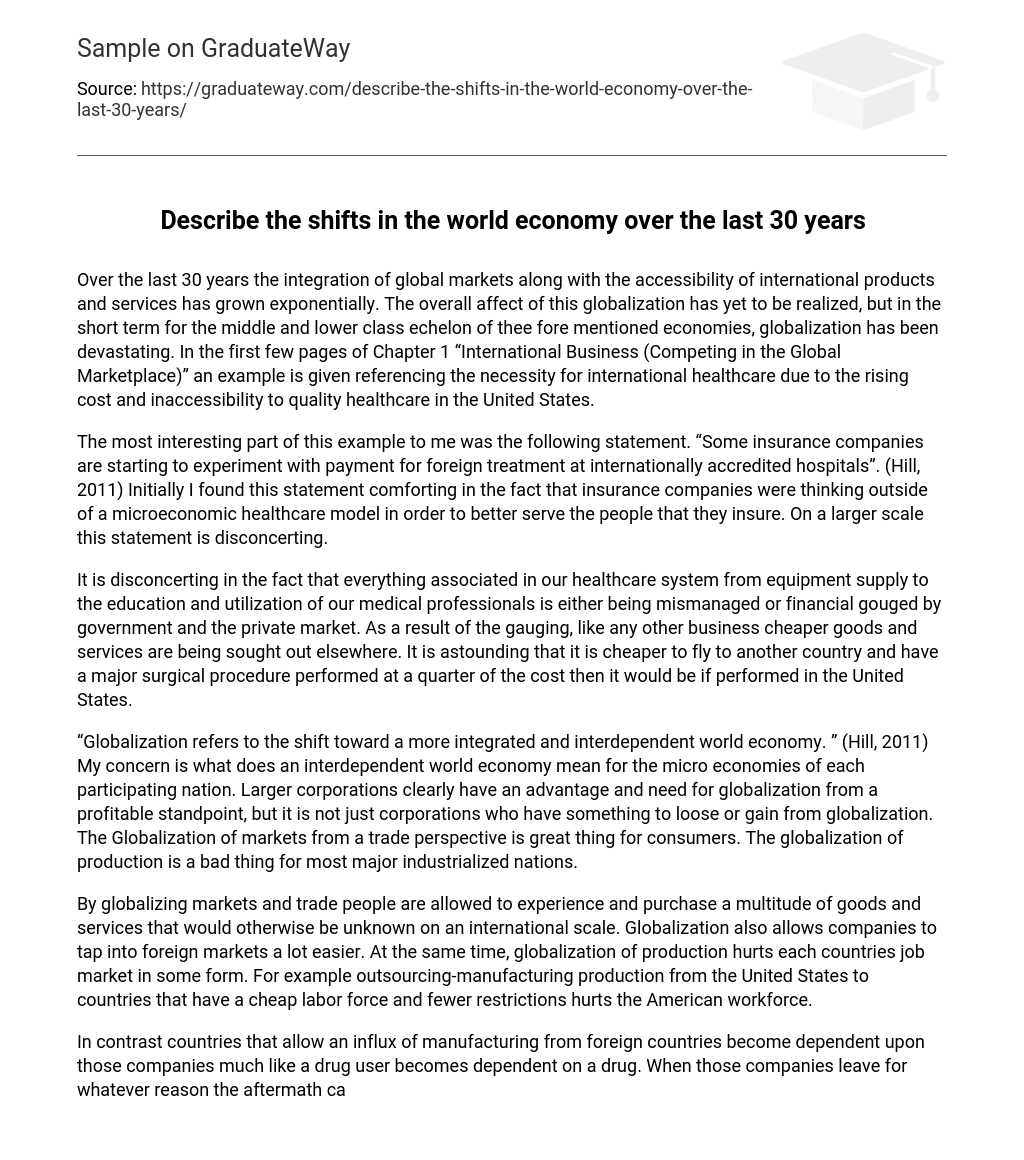Over the past thirty years, the integration of global markets and the availability of international products and services have witnessed substantial growth. The complete consequences of this globalization remain uncertain. Nonetheless, for the middle and lower classes in those economies referenced earlier, globalization has had severe short-term repercussions. In the first few pages of Chapter 1 in “International Business (Competing in the Global Marketplace),” there is a mention regarding the necessity for international healthcare due to escalating expenses and inadequate accessibility to quality healthcare within the United States.
One notable aspect of this example is the mention of insurance companies exploring the payment for treatment at internationally accredited hospitals abroad (Hill, 2011). At first, this statement provided reassurance as it signified insurance companies’ willingness to go beyond the conventional microeconomic healthcare approach for the benefit of their policyholders. However, viewed from a broader perspective, this statement raises concerns.
It is concerning that our healthcare system suffers from mismanagement and financial exploitation, affecting everything from equipment supply to the education and utilization of medical professionals. This leads to seeking cheaper options elsewhere, such as traveling to another country for a major surgical procedure at a quarter of the cost compared to the United States.
Globalization is the act of forming a more interconnected and interdependent global economy. This has both positive and negative impacts on the micro economies of individual countries. While larger corporations benefit from globalization, it also affects other entities. The expansion of markets globally benefits consumers by creating more trade opportunities. However, the expansion of production globally presents challenges for most major industrialized nations.
Globalization has expanded consumers’ access to a diverse range of products and services worldwide, offering greater options. Additionally, it has facilitated business expansion into foreign markets. Nonetheless, the globalized production process negatively affects job markets in certain countries. Relocating manufacturing to nations with cheaper labor and lax regulations adversely impacts the workforce within the originating country, such as the United States.
Countries that welcome foreign manufacturing become reliant on those companies, similar to how a drug addict becomes dependent on a drug. If these companies depart for any reason, the consequences can be devastating. The Malaysian market serves as a prime illustration of this. The manufacturing industry holds great significance in driving economic growth for Malaysia. In 1987, it accounted for 19.8% of the GDP, which later rose to 24.6% in 1990 and 44.8% in 2001.
“(Tsen, 2005) Malaysia’s GDP became heavily reliant on foreign product manufacturing, making it susceptible to changes in the micro economies that these corporations depend on for sales. Many Malaysian manufacturing job market companies were influenced by the micro economy of the United States of America. In 2008, a global financial crisis emerged and caused the American consumer market infrastructure to deteriorate. Consequently, the Malaysian manufacturing market began to decline.
The dissipation is evident in Malaysia’s importation and exportation of goods. According to the ADBI Institute’s working paper by Shankaran Nambiar titled “Malaysia and the Global Crisis: Impact, Response, and Rebalancing Strategies,” two economic indicators, exports and the industrial production index, reflect the effects of the ongoing crisis. Export figures performed strongly in the first three quarters of 2008 but declined towards the year’s end (Figure 3). In January 2008, exports saw a 10% increase.
In April 2008, the export growth rate in Malaysia increased from 4% to 20.9%. However, it turned negative (-2.6%) in October of the same year and continued to decline. By December 2008, there was a significant decrease of -14.9%, which worsened further to -27.8% in January 2009. Similarly, imports in Malaysia followed a similar trend as exports, with an increase of around 11% compared to the previous year in February 2008 and exceeding10% in June and July (12.5% and 15.0% respectively).
The decline in imports displayed a negative trend, with figures dropping from -5.3% in October 2008 to -23.1% in December 2008 and further decreasing to -32.0% in January 2009 (Nambiar, 2009). This significant decrease in Gross Domestic Product (GDP) was a direct result of Malaysia’s economy being heavily reliant on the global market, specifically the United States. The financial crisis that occurred in 2007 and 2008 had a global impact similar to the Great Depression of the 1930s, affecting not only the United States but also Germany, France, Spain, Italy, Greece, and Japan.
All of these countries – Britain, North America, and Hong Kong – are economically interconnected through Globalization. This interconnectivity implies that the consumer marketplace’s validity affects them at both micro and macro levels. Consequently, their economies have become more reliant on each other. If one economy begins to decline, it has a global impact. Globalization necessitates increased accountability and ethics that should transcend ethnic, religious, and cultural divisions. The emphasis is on sustaining stability in their microeconomies while fostering macroeconomic growth.
Globalization necessitates responsible management by governments and corporations to prevent potential financial disaster. This concept is discussed in references such as Hill, C. W. (2011), Nambiar, S. (2009), and Tsen, W. H. (2005).





